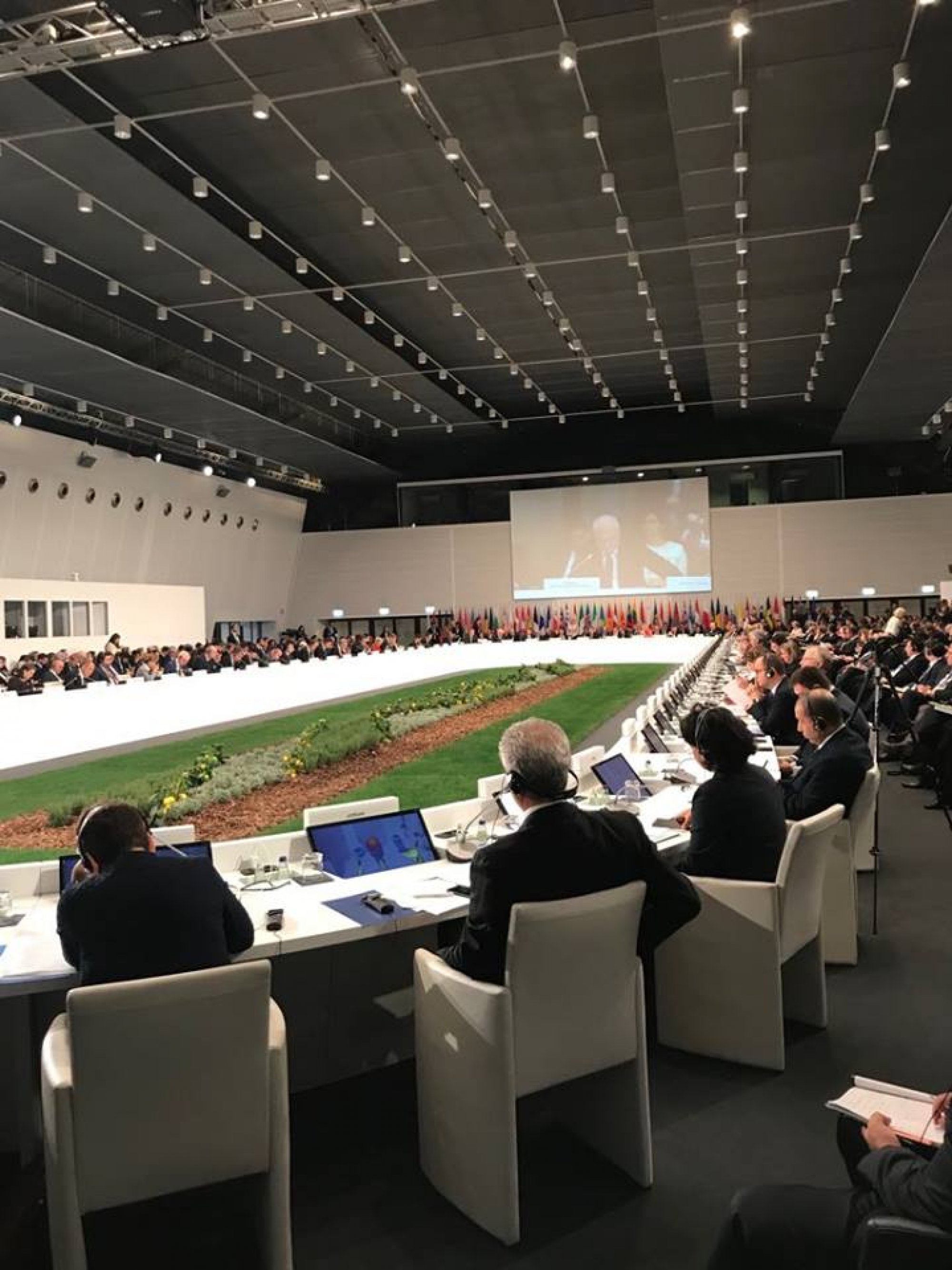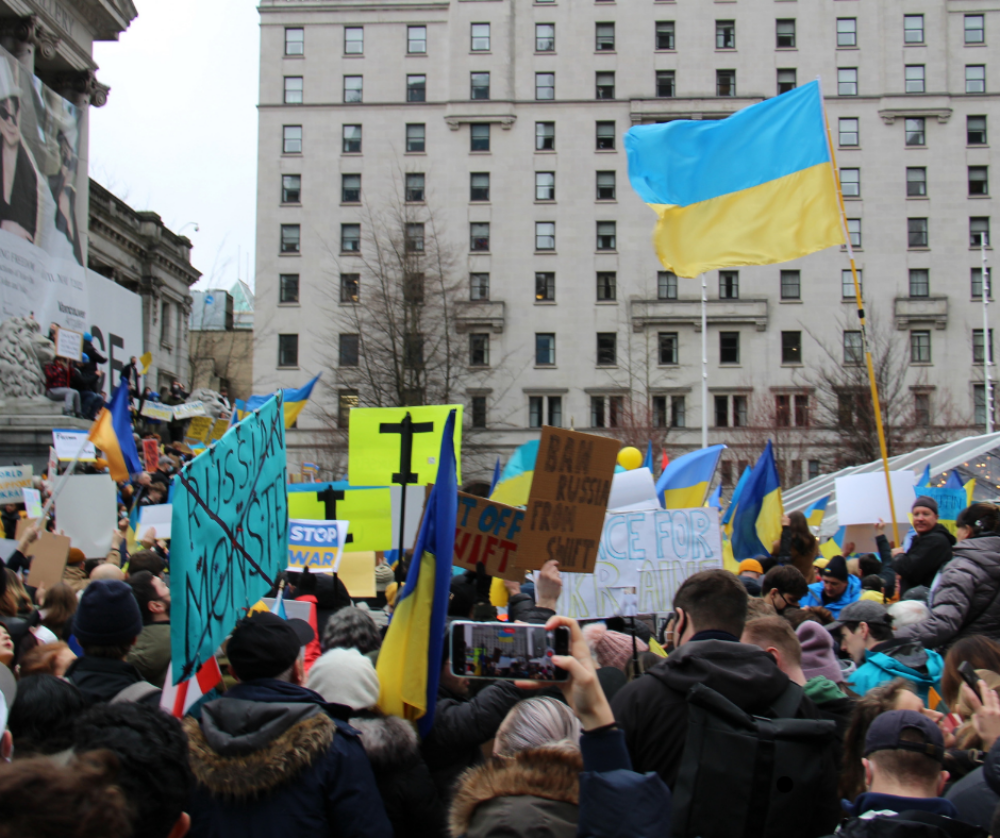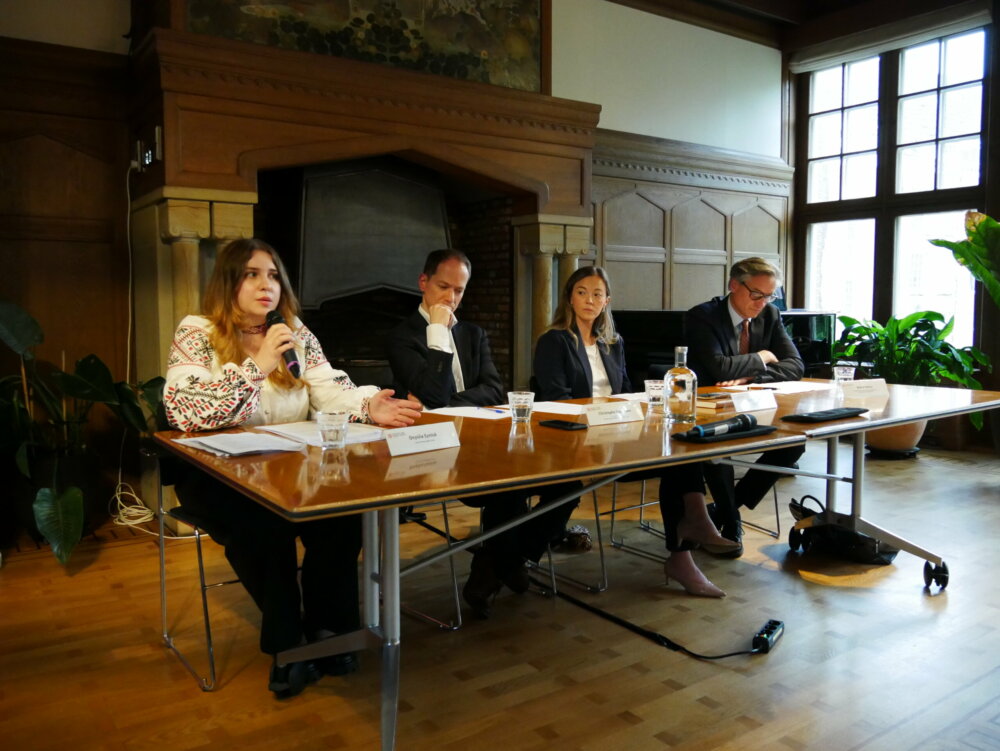
OSCE Ministerial Council in Milan: Expressing differences rather than resolving them
The 25th OSCE Ministerial Council (MC) meeting in Milan took place against the backdrop of a deteriorating crisis of European security and a recent escalation of tensions between Ukraine and Russia in Black Sea near the Kerch Strait.
Tensions around the Kerch Strait, a narrow entry point connecting the Black Sea and the Azov Sea, had been rising in recent months. It began when Russia started building a bridge between the Russian mainland and the Crimean Peninsula, which Russia illegally annexed in 2014. The bridge was partially opened in May and around this time, Ukraine began complaining of considerable delays for some of its ships passing through the strait due to tougher controls and Russian patrols.
The situation escalated on 25 November when Russian coast guard boats rammed and fired on three Ukrainian naval vessels which intended to pass through the strait. Russia seized the boats and detained the crew members.
At their annual OSCE MC meeting, Foreign Ministers failed to take any concrete measures to deescalate the Azov Sea crisis, despite a joint plea by OSCE Secretary General Thomas Greminger and OSCE Chairperson-in-Office, Italian Foreign Minister Enzo Moavero Milanesi. In an article published ahead of the meeting, both called on Foreign Ministers to make full use of the OSCE MC meeting and to enter into dialogue to deescalate tensions in the Azov Sea.
Yet, instead of dialogue, confrontational rhetoric and mutual accusations dominated the discussions in the plenary hall.
Clashes in the plenary
Italian Foreign Minister Enzo Moavero Milanesi, who took over the function of OSCE Chairperson-in-Office from Angelino Alfano on 1 June after elections in Italy, formally opened the conference. Speaking in the plenary hall of the Milan Convention Centre to 39 Foreign Ministers he said: “We have an opportunity to show how a multilateral organization can serve as a strong example of multilateral cooperation and diplomacy.” He urged participating States to overcome divisions and to “engage in a civil dialogue around the same table”.
OSCE Secretary General Thomas Greminger found stronger words, stating that the current security environment was more polarized and more unstable than it had been in decades. “In fact, the security order is breaking down,” he said adding that this demanded a cooperative response. “What kind of world do we want to live in?” he asked. “I assume no one wants war.” Greminger called on all participating States to make full use of the MC meeting, to enter into sincere dialogue, to reduce tensions and to restore a sense of common purpose.
Ukrainian Foreign Minister Pavlo Klimkin said that Russia’s aggression against his country and the illegal occupation and annexation of the Crimean Peninsula should never by accepted by the international community. He denounced the recent seizure of three Ukrainian naval vessels and their crew by Russian border guards. “There can never be business as usual or a common, unifying agenda,” he said. “We have to increase the cost for Russia, including with comprehensive and tailored sanctions.”
A.Wess Mitchell, Assistant Secretary of State at the Bureau of European and Eurasian Affairs, represented the United States at the MC meeting. U.S. Secretary of State Mike Pompeo was unable to come to Milan because of the funeral of former U.S. President George H.W. Bush.
Mitchell accused Russia of having violated the principles of the Helsinki Final Act. He denounced what he called “Russia’s lawless actions in Ukraine”. “We are currently witnessing an escalation of tensions in the Azov Sea which is the continuation of a pattern,” he said. He also said that “Russia’s destabilizing actions have prompted NATO to increase its defense force posture”.
Federica Mogherini, the EU’s High Representative for Foreign Affairs and Security Policy, said that events in the Azov Sea were a reason for grave concern and represented a case where common principles were being broken. “We also urge Russia to release the captured vessels, their crew and equipment unconditionally and without delay,” she said.
Russian Foreign Minister Sergey Lavrov seemed unimpressed by all the criticism. “In an effort to achieve supremacy, a small group of countries is using blackmail, pressure and threats, and thinks nothing of meddling in internal affairs,” he said. He cited the “support for the coup d’état in Ukraine” as evidence of this. As in previous years, he also lamented NATO’s expansion to the East, the deployment of anti-missile defence systems by the United States, as well as sanctions against Russia. “All of this has led to a crisis of trust in the Euro-Atlantic region,” he concluded. “And now the U.S. also wants to bury the INF Treaty.”
Side event on militarization of the Azov Sea
In an effort to rally support, Ukraine organised a side event on the margins of the MC meeting on the topic of “the problem of militarization of the Autonomous Republic of Crimea and the city of Sevastopol (Ukraine), as well as parts of the Black Sea and the Sea of Azov”. The side event was co-sponsored by Canada, Denmark, Estonia, Georgia, Latvia, Lithuania, Poland, Romania, Sweden and the United States.
The Canadian Foreign Minister, Chrystia Freeland, who has family roots in Ukraine, used the presence of Ukrainian television journalists at the side event to speak in Ukrainian, expressing Canada’s full support for Ukraine’s sovereignty and territorial integrity. “Russia’s illegal annexation of Crimea, its direct involvement in the conflict in the Donbass, and now its illegal actions targeting Ukrainian sailors and vessels cannot and must not be accepted by the international community,” she said.
Numerous bilateral meetings
Besides the discussions in the plenary hall and in the side events, numerous bilateral meetings took place behind closed doors. Bilateral discussions are particularly useful as they offer an opportunity for more open exchanges on urgent security matters.
For example, Russian Foreign Minister Sergey Lavorv held a bilateral meeting with German Foreign Minister Heiko Maas in which they not only discussed arms control issues (such as the INF Treaty), but also explored the possibility to extend the OSCE Special Monitoring Mission to the Azov Sea area. While there is no agreement on this, the issue might be taken up again at the meeting of the Normandy Format on 11 December, according to Maas, who gave a press conference right after his meeting with Foreign Minister Lavrov. “There is still a lot of scepticism about this on the Russian side,” he said.
Also, at the OSCE MC a discussion was organised by the political director of the Italian Foreign Ministry that looked at new options to shape a peacekeeping mission for eastern Ukraine. Such a meeting was already organised on the margins of the Vienna MC meeting in 2017.
On another positive note, the Foreign Ministers of Armenia and Azerbaijan held a bilateral meeting on the margins of the MC. A joint statement was issued by the Minsk Group Co-Chair countries(the Russian Federation, the United States of America, and France) and the Foreign Ministers of Azerbaijan and Armenia. They agreed to continue working towards a peaceful settlement of the Nagorno-Karabakh conflict. Such a joint statement was last issued three years ago and is therefore considered a positive step forward.
A meeting between Russian Foreign Minister Sergey Lavrov and U.S. Assistant Secretary of State Mitchell did, however, not materialize. This would have been important, not only because of increasing tensions in and around Ukraine, but also because of Russia’s alleged violation of the INF Treaty. The NATO Foreign Ministers meeting on 4 December – that preceded the OSCE MC meeting – concluded that Russia had developed a new missile system in violation of the INF Treaty and gave Russia 60 days to come back into compliance.
In general, the impression emerged that Foreign Ministers did not take full advantage of the large gathering to address the deteriorating security situation. A meeting of the Normandy Format Foreign Ministers did not take place as not all parties were willing to hold such a meeting on the margins of the OSCE MC. The fact that the French Foreign Minister was not in Milan was also likely a contributing factor.
Adoption of decisions in all three security dimensions
Nevertheless, the Foreign Ministers adopted all in all nine decisions by consensus. Among them are decisions on the role of youth in contributing to peace and security efforts, on human capital development in the digital era, on preventing and combating violence against women, on combating child trafficking, and on the digital economy.
OSCE participating States alsoagreed to further their support for the OSCE’s work in addressing the threat posed by small arms and light weapons and stockpiles of conventional ammunition.
One of the main successes of the Milan MC was the adoption of a decision on the safety of journalists, the first decision in the human dimension in four years. The topic of safety of journalists had been discussed for many years ahead of MC meetings but has always failed to reach consensus. The adoption of this decision is very timely and sends a strong signal, especially given the many attacks and threats against journalists in the entire OSCE region.
There was also a ministerial statement supporting the continued progress in the negotiations on the Transdniestrian Settlement Process. The statement confirms that the positive dynamics in the negotiations continue. Last year, this translated into concrete action on the ground when the Gura Bicului-Bychok bridge, a key transportation corridor between Moldova and Transdniestria, was reopened. This year, under the Italian Chairmanship, the parties signed the Rome Protocol which will lead to further positive improvements for people on the ground.
The MC also adopted a declaration on security and cooperation in the Mediterranean area. This was a top priority for the Italian Chairmanship, having invested political and financial capital in this topic throughout the year. The declaration emphasises the interlinkage between European and Mediterranean security and includes possible future priority areas for the OSCE Mediterranean Partnership. This declaration is important as the Mediterranean Partnership countries have long sought a closer relationship with OSCE states. This could be a first step to a more strategic partnership.
The MC also agreed via silence procedure that Albania will chair the OSCE in 2020. This decision creates greater predictability and continuity for the political leadership of the Organization. Still, it was unusual that there was no Ministerial Troika meeting at the OSCE MC in Milan. Furthermore, no country has yet expressed an interest in chairing the OSCE in 2021. This shows again that ways need to be found to make it more attractive for countries to chair the OSCE.
Failed decisions
Among the many drafts decisions that failed to reach consensus, one deserves particular mention. It was on the topic of strengthening military transparency and addressing risk reduction and incident prevention. The draft decision would have helped to address the current dangerous security environment, in particular with regard to military tensions between Russia and the West, as well as between Russia and Ukraine on the rise.
In addition, an increased amount of NATO and Russian military exercises and activities create fear and suspicion on both sides, mostly due to a lack of clarity of intentions. As a result, there is a heightened risk of military confrontation caused by misinterpretation and misperceptions.
The draft would have addressed precisely this by suggesting to improve military to military contacts and exchange views on threat perceptions and military exercises. It also proposed concrete measures on how to update the 2011 Vienna Document on Confidence- and Security-Building Measures, a politically-binding agreement among the 57 OSCE participating States detailing information-sharing, inspections and evaluations in the military realm. The modernization of the Vienna Document is long overdue.
As in previous years, the Milan MC also failed to adopt a political declaration by consensus. The last time such a declaration was adopted was in 2002. This is due to the fact that participating States have fundamentally divergent views on the conflict in and around Ukraine as well as on protracted conflicts in the OSCE region.
Civil society denied access to opening session
As every year, the OSCE MC meeting was preceded by a Parallel Civil Society Conference. At the end of their conference, civil society representatives adopted recommendations that they hoped would be taken into consideration by OSCE participating States.
The recommendations are comprised of two documents, the first is an appeal to the OSCE to listen to the voice of civil society, and the second is a statement on safeguarding NGO participation in OSCE events. A third document, the Milano Declaration, contains proposals for reviving the OSCE comprehensive security concept, rebuilding democratic institutions and revitalizing the resilience of societies.
The civil society recommendations are usually personally received by the OSCE Chairperson-in-Office, the Foreign Minister of the country holding the Chairmanship. This year, Italy broke with this tradition, as the Italian Foreign Minister decided not to attend the civil society gathering. Instead, the civil society recommendations were received by Italian Ambassador Marco Clemente.
Furthermore, and again breaking with tradition, Italy denied civil society representatives access to the opening and closing sessions of the OSCE MC meeting. Usually civil society representatives are allowed to attend the opening and closing sessions (together with media representatives). This was not possible in Milan. Making things worse, there were no TV screens and no live links available in the room assigned to NGO representatives.
When asked about this during the final press conference, Italian Foreign Minister Moavero Milanesi replied that he was not aware of the situation. Incoming Chairperson-in-Office, Slovakia’s Foreign Minister Miroslav Lajcak assured everyone that this would not set a precedent for the next year.
Formal closure of MC before adoption of decisions
In another unprecedented move, Italian Foreign Minister Enzo Moavero Milanesi decided to close the MC meeting prior to the adoption of decisions. Negotiations were held up due to differences on the drafts on Mediterranean security and on countering illicit cross-border trafficking in cultural property, both topics that were set priorities for the Italian Chairmanship.
Instead of going into overtime – which is almost standard practice for OSCE MC meetings – the Italian Chairmanship decided to formally close the MC meeting on Friday at around noon and held its final press conference, while delegates were still negotiating the draft decisions.
This left many long-time OSCE observers baffled. OSCE MC meetings, just like any other formal summit, cannot be closed if negotiations on final decisions are ongoing.
When confronted with this during the final press conference, Moavero Milanesi said that “the outcome of the meeting will be made public in a few hours as technical negotiations are ongoing”. OSCE Secretary General Thomas Greminger clarified that “the meeting is not over”. The Italian Foreign Minister left the MC meeting after the final press conference.
Overall, the Milan MC meeting was successful as OSCE states reached consensus on important decisions in all three OSCE security dimensions. However, in light of the very serious security threats and escalation of tensions in the Black and Azov Seas, it seemed that a concrete political initiative to help all parties come together in a diplomatic effort was missing.
On the one hand this is of course mainly up to the states concerned, but on the other hand the Italian OSCE Chairmanship and key states such as Germany, France and the U.S. should help bring the parties together and make innovative and concrete diplomatic proposals.
Since there are very few places where all interested states come around the same table these days, it is a shame that the Milan OSCE MC meeting was not used more effectively to resolve differences rather than just expressing them.



Comments
* Your email address will not be published